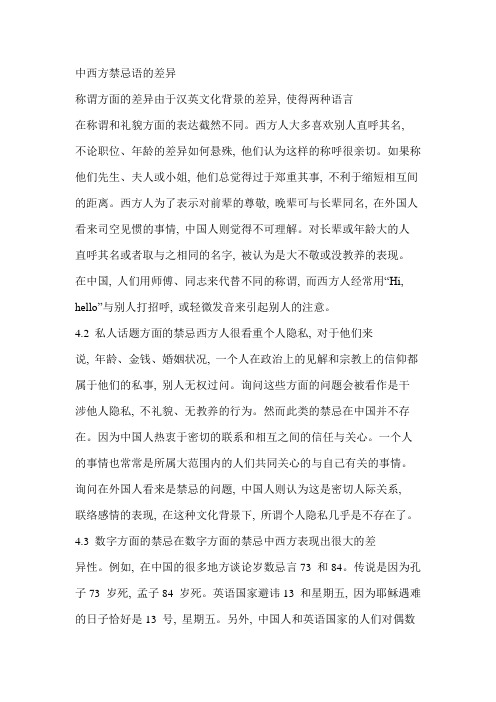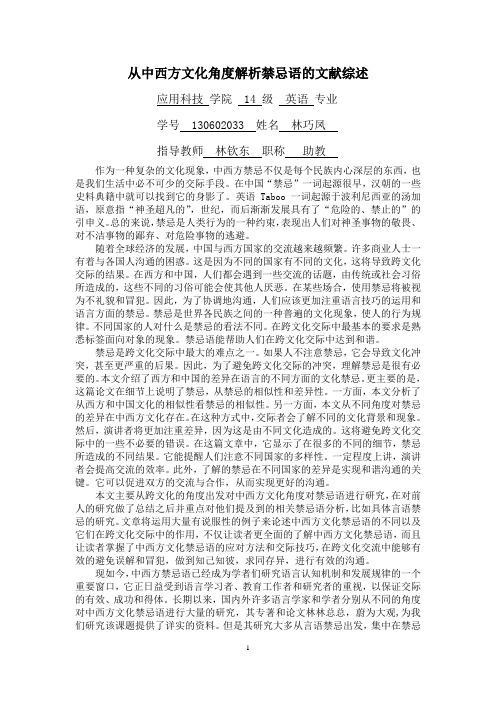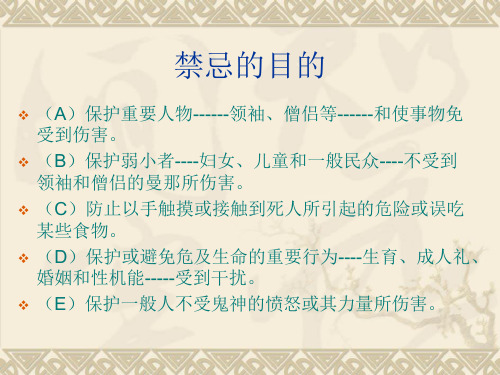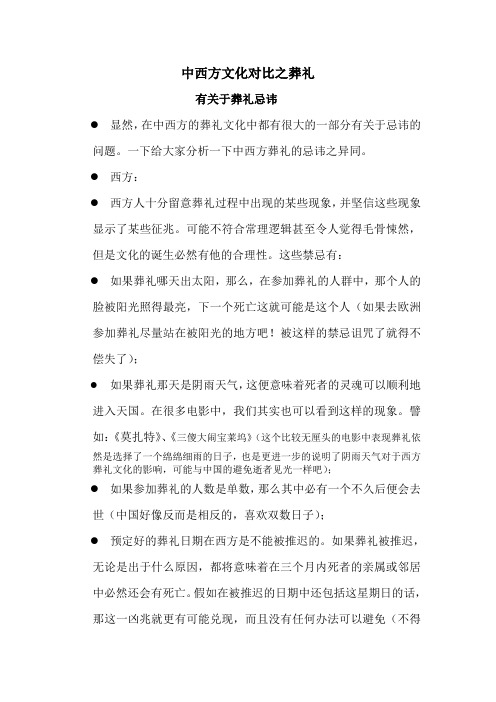中西方文化禁忌
浅论中西方禁忌语对比

浅论中西方禁忌语对比中西方文化有着不同的禁忌语言,不同的文化背景和社会习惯导致了不同的语言禁忌。
在中西方文化中,禁忌语是指因为特定原因而被视为不适当或不礼貌的言辞或用语。
这些禁忌语言可以包括对特定人群的称谓、特定事物的称呼、以及对某些话题的谈论等。
本文将对中西方的禁忌语进行对比,探讨其不同之处。
中西方在对待称呼的禁忌上有着不同的标准。
在西方文化中,称呼他人时通常会避免使用过于亲昵的称呼,尤其是在初次见面时。
直呼对方姓氏或称呼对方为先生、女士等都是很普遍的。
相比之下,在中国文化中,称呼对方通常会更加注重亲热和尊敬。
在称呼长辈或客人时,通常会加上尊称词如“阿姨”、“叔叔”等。
在亲密关系中,也常使用昵称来称呼对方,这在西方文化中是不太常见的。
在谈论某些特殊话题时,中西方也存在着不同的禁忌。
在西方文化中,谈论个人隐私、金钱、宗教信仰等话题都是比较敏感的。
在社交场合中,很少会有人主动谈论这些话题,通常会避免触及。
相比之下,在中国文化中,谈论个人隐私相对更加私人化,一般在不熟悉的人面前不会主动提及。
谈论金钱、宗教等问题在中国文化中通常并不是严格的禁忌,有时候人们之间也会就这些话题进行交流。
对于不同年龄、不同身份的人群,在中西方文化中也有着不同的称呼禁忌。
在西方文化中,谈论他人的年龄、财富等属于隐私问题,通常不会在公众场合涉及这些话题。
而在中国文化中,对于长辈、领导等身份的人,通常会特别尊敬对待,避免直呼其名。
在西方,通常会使用尊称词如“sir”、“madam”等,而在中国,称呼长辈或领导时通常会使用尊称词如“老师”、“领导”等。
中西方文化在禁忌语言方面存在着一些差异。
在称呼、谈论话题、对待不同身份人群等方面,中西方都有各自的文化传统和社会规范。
了解并尊重对方的文化禁忌,是进行跨文化交流的重要基础。
希望通过本文的介绍,读者能够更加了解中西方的禁忌语言差异,并在与不同文化背景的人交往时更加得体。
中西文化禁忌对比

• 打喷嚏( sneeze) 是一种生理现象, 但在公共场合或与朋友聚会, 绝对禁 止冲着他人打喷嚏。这是中西都有 的禁忌。实在要打喷嚏或擤鼻子时, 要用纸或手绢捂着鼻子, 转过身去。 事后还要说一声对不起( Excuse me) 周围的人会说一声“上帝保佑 你” ( God bless you) ,或“ 祝你健 康” ( keep fit/wish you healthy) 的 话语, 其来源说法不一。
公共场合禁忌( taboos in public places)
• 在英语国家, 人们在公共场合活动要严格按 照先来后到的顺序, 严禁别人打扰。比如到 邮局或银行办事, 或到某处参观, 人们会根 据先来后到的顺序排起队来, 并保持一定的 距离。他人不能加塞儿( queen- jumping) 。 到餐馆用餐, 如果人多客满, 后到的人不能 打扰先到的人, 必须在门口等候, 也不可到 餐厅内任意游走, 或自己找位指在 某个民族或宗教 传统文化里禁忌 的一些事物,行 动或言语。
来源:灵物崇拜
• 十八世纪英国航海家库克来到南太平洋的 汤加群岛,发现那里有许多奇特的现象, 例如,某些东西只允许特定的头等人物(神、 僧侣、国王、酋长)使用,而不允许一般人 沾边;或只允许作特定的用途,而不准用 于一般的目的;或不许某一社会集团(例如 妇女)的人使用等等。那里的居民称这种禁 忌为taboo 直译为“塔布”。
排泄
• 厕所 在美国一般都叫rest room或bath room(男女厕均可) 或分别叫做 men‘s room 或 ladies‘ room(=powder room),不过在飞机上,则叫 lavatory,在军中又叫 latrine。至于 W.C.(water closet)乃是过去英国人用的, 在美国,几乎没有人使用。 • 此外,john是 bath room 或 toilet 的意思(也叫 outhouse),这通常是指在户外工作场地所使用的临时或 流动性厕所(有时前面也加 portable 一字)。 • He went to the john a few minutes ago.(他在几分钟前 上了厕所。) • 其他说法pass water, answer nature’ s call, wash one’ s hands, do one’ s business等等
中西方禁忌语的差异

中西方禁忌语的差异称谓方面的差异由于汉英文化背景的差异, 使得两种语言在称谓和礼貌方面的表达截然不同。
西方人大多喜欢别人直呼其名,不论职位、年龄的差异如何悬殊, 他们认为这样的称呼很亲切。
如果称他们先生、夫人或小姐, 他们总觉得过于郑重其事, 不利于缩短相互间的距离。
西方人为了表示对前辈的尊敬, 晚辈可与长辈同名, 在外国人看来司空见惯的事情, 中国人则觉得不可理解。
对长辈或年龄大的人直呼其名或者取与之相同的名字, 被认为是大不敬或没教养的表现。
在中国, 人们用师傅、同志来代替不同的称谓, 而西方人经常用“Hi, hello”与别人打招呼, 或轻微发音来引起别人的注意。
4.2 私人话题方面的禁忌西方人很看重个人隐私, 对于他们来说, 年龄、金钱、婚姻状况, 一个人在政治上的见解和宗教上的信仰都属于他们的私事, 别人无权过问。
询问这些方面的问题会被看作是干涉他人隐私, 不礼貌、无教养的行为。
然而此类的禁忌在中国并不存在。
因为中国人热衷于密切的联系和相互之间的信任与关心。
一个人的事情也常常是所属大范围内的人们共同关心的与自己有关的事情。
询问在外国人看来是禁忌的问题, 中国人则认为这是密切人际关系,联络感情的表现, 在这种文化背景下, 所谓个人隐私几乎是不存在了。
4.3 数字方面的禁忌在数字方面的禁忌中西方表现出很大的差异性。
例如, 在中国的很多地方谈论岁数忌言73 和84。
传说是因为孔子73 岁死, 孟子84 岁死。
英语国家避讳13 和星期五, 因为耶稣遇难的日子恰好是13 号, 星期五。
另外, 中国人和英语国家的人们对偶数和奇数的态度也不同。
中国人偏爱偶数, 好事成双, 六六大顺, 成双成对都是很好的例子; 而西方人则把奇数(13 除外) 当作幸运的象征。
4.4 动物方面的禁忌在中国, 人们认为猫头鹰是倒霉、晦气的象征, 汉语中夜猫子进宅意味着厄运将至, 而在西方, 猫头鹰则被认为是智慧的象征; 中国人对蝙蝠很有好感, 认为蝙蝠是吉祥、健康、幸福的象征, 通常与寿字连在一起出现, 如“五蝠拜寿”。
中西方禁忌文化 (2)

中西方禁忌文化组长:马文莉(2011142134)组员:符小群(2011142102)吴可嘉(2011142132)花毛措(2011142160)锁溯(2011142139)谢琦(2011142143)禁忌的定义禁忌指在一些特定的文化或是在生活起居中被禁止、忌讳的一些行为、事物和思想等。
是古代人敬畏超自然力量或因为迷信观念而采取的消极防范措施。
它在古代社会生活中曾经起着法律一样的规范与制约作用。
禁忌的国际通用名词是Taboo或Tabu(音译“塔布”或“塔怖”),该词源于中太平洋的波利尼西亚群岛,原为太平洋波利尼西亚汤加岛人的土语,其含义是神圣的、不洁的、危险的和不可接触的.禁忌的起源禁忌的起源一般认为有四种观点:(一)灵力说:灵力说更多的是着眼于禁忌的原始状态,禁忌是从鬼魂崇拜中产生的。
实际上是从人类信仰发展史方面对禁忌的认识,它分析了人们对灵力的信仰以及由此一信仰而产生的情感诸如崇敬和畏惧等等,并据此而追溯到了禁忌的来源。
一般说来,灵力说更多的是着眼于禁忌的原始状态和原始的禁忌状态的。
•(二)欲望说:欲望说将禁忌归结为心理上对欲望的抑制。
弗洛伊德在《图腾与禁忌》中写道:“塔布是一种有某些权威从外部强行施加的原始禁止,它针对的是人类所屈从的最大欲望。
”欲望说认为欲望的抑制便是禁忌的根本来源,它主要从心理学上对禁忌的来源进行了追溯。
(三)仪式说:仪式说指出,禁忌来源于仪式无理的社会规定性。
它从社会学的角度对禁忌的来源作了说明。
弗雷泽曾在《金枝》一书中提到“有时,社群首领、酋长或神权的代表人物(如巫师等)就可以有权宣布任何事物为禁忌”。
原始人类处于社会化的需要,并不真正的去思考或考察此种禁忌形成的合理依据,而是随着社会化的约定俗成,强制服从。
(四)教训说:这一观点认为禁忌来源于人们把对某种偶然因素的共同误解作为教训来加以汲取。
禁忌发展阶段禁忌的发展大致被分为三个阶段:•原初阶段:丧葬禁忌与祭祖是禁忌的原初形态,与鬼魂信仰的联系最直接。
中西文化语言禁忌

中西方文化中使用语言的禁忌在许多语言里都忌讳诅咒、骂人的话。
英语和汉语都是这样的,但还要说明一下:第一,有些骂人的话过于粗鄙、难听,所以受到社会更严格的限制。
英语中的Jesus Christ, Holy Mary, Son of a bitCh就是这种话;而Damn, Damn it,Hell这样的话在语气上就稍微轻一些。
请注意,在英语中,大部分诅咒、骂人的话与基督教的词语和名称有关。
在汉语中这种固定的咒骂或骂人的话似乎少些,最常用的是“他妈的”,但听的人不会引起很强烈的反感,因为有时它巳转化为无教养的人的口头语。
第二,诅咒、骂人的话受到年龄、性别、职业的限制。
孩子骂人马上会受到大人责备。
妇女骂人会被人认为粗俗失礼。
教师骂人被认为有失体统。
第三,这种话也受环境和场合的限制。
在当众发言、课堂教学或和有一定社会地位的人在一起时,人们就不大会说诅咒、骂人的话。
在家里、在劳动场合、在办公室、在公共汽车上或市场上,说的人就比较多。
应当指出,人们对诅咒、骂人的话反应并不始终如一。
有些这样的话听得多了,也就不那么刺耳。
现在人们常听到年轻人用骂人活。
不过,对非本族人还是少讲祖活为妙。
现在谈一下英语和汉语在禁忌方面的不同处,先讲一个有趣的故事;一位50来岁的美国妇女在中国任教。
有一位年轻的中国同事请她到自己家里来吃饭。
一进门。
女主人就把4岁的女儿介绍给客人。
小姑娘用英语说:“阿姨好”!她妈妈跟她说过,见了成年妇女要这样问好。
“不对,不能叫阿姨”,妈妈连忙纠正说,“要叫奶奶。
”“不要叫奶奶。
就叫我阿姨好了。
”“那太没有礼貌了。
您比我年纪大多了。
”美国妇女脸红了,笑笑说:“就叫我阿姨吧。
我喜欢这样”。
为什么美国妇女在这种场合会感到尬尴呢?因为中国人和美国人对待年龄问题的态度不同。
对大多数英国人和美国人来说,打听陌生入或不大熟悉的人的年龄是不得体的。
此外,收入多少、是否已婚、政治倾向、宗教信仰等,除非对方表示不大意,这些情况也不宜过问,否则就是失礼。
文化禁忌

在跨文化交往中.禁忌是最敏感的话题。
所谓禁忌(taboo)就是日常生活或工作中禁止或忌讳人们做的事情或说的话;禁忌是世界各民族共有的文化现象,只是禁忌的内容和形式不同罢了。
文化禁忌的研究也因此成为了跨文化交际研究者的重要内容。
禁忌几平是无处不在,从日常生活,到政治经济的各个方面,我们这里只涉及中西跨文化交际中最重要的方面。
一、社交礼俗禁忌在西方,拜访某人需要事先预约,切忌突然造访。
因为突然造访打乱了被访者的工作安排,给他造成了极大的不便。
而中国人近年来虽然也在商界、政界甚至日常生活中开始预约,但没有那么严格.突然造访的事情不被看作是那么严重的侵犯。
还有人用突然造访给人惊喜.完全不觉得这是对对方的极大的不尊重。
另外,在到访时间上中西也有很大的不同.如果约定为十点,中国人认为十点是最终期限,最晚十点到达,最好提前几分钟,因为不能让主人等.而西方人认为十点是可以到达的最早时间,最好推迟几分钟.因为要给主人充分的准备时间。
在谈话的内容方面,西方国家严禁涉及个人隐私不能问年龄、收入、婚姻、恋爱,财产、胖瘦等等。
个人隐私被放置在极高的位置。
询问个人时间的安排都可能会被看作是侵犯隐私.由此看见西方的个人主义、自我中心是多么的严重。
在中国.谈论年龄、婚姻、身材等是非常正常的事,中国人与人之间的关系更加密切.另外.在公共场所进行交谈时.西方绝对禁止大声喧哗.人们安静的交谈避免自己的交谈影响他人。
中国的很多公共场所人声嘈杂.如果不大声嚷嚷.就互相听不见时间长了就形成了嗓门大的习惯。
二、饮食习惯禁忌西方人忌吃肥肉、鸡鸭的皮,动物的内脏.忌吃大蒜等味道过于浓烈的调味品。
进餐时喝汤忌出声,尤其禁忌用刀叉弄响水杯,因为那会招来厄运。
吃自助餐时,禁忌自己盘中剩下食物。
中国人吃饭时,忌用筷子敲打空碗(因为那是乞讨者的行为)或把筷子插在盛满米饭的晚中(因为那是给过世的人的祭品),忌把空碗反扣在桌上(因为那是诅咒她人生病)。
忌座位没有尊卑长幼,不分主次.在海边居住的人们,吃鱼时忌把鱼翻过来.因为这样表示翻船,会给渔民带来厄运。
中西禁忌文化比较

中西禁忌文化比较作为跨文化交际的主要工具,语言与文化密不可分,语言本身也是一种文化现象。
本文从中英委婉语的视角探讨中西方在宗教迷信、社会心理、社会文明禁忌文化方面的异同点,以减少跨文化交际中可能出现的尴尬与麻烦。
标签:避讳与禁忌;中西文化;委婉语一、避讳、禁忌文化与委婉语的关系中西方避讳与禁忌思想历经数千年的变迁与发展,作为一种文化现象,不但没有消失,反而在此基础上产生出形形色色的委婉表达方式,这些曲折的表达又构成了另一种独特的文化现象。
委婉语文化也随历史发展、社会形态变迁和人们价值观的改变等经历着发展与变化。
作为避讳和禁忌文化的产物,委婉语长期以来广泛应用于社会各阶层及各领域,成为跨文化交际中协调人际关系和社会关系的重要手段。
因此,委婉语本身就是一种文化现象。
美国学者休.劳森说“委婉语如此深深植根于我们的语言,以致我们中间没有谁——即使是那些自诩言谈直截了当的人——能够在不使用委婉语的情况下过完一天。
”[1]各民族的语言禁忌都是在其特定的社会与民族文化中形成的,跨文化交际中若稍有不慎,便会产生尴尬、矛盾甚至冲突。
早在中国古代《礼记·曲礼上》就有记载:“入境而问禁,入国而问俗,入门而问讳。
”为避免言语犯禁,各类委婉语随之诞生。
语言学家陈原认为,委婉语词就是用“好听的,含蓄的,使人少受刺激的,或矒着邪恶的代表使他一时听不明白的代词,代替所要禁忌的语言”[2]二、中西禁忌文化与委婉语从古至今,禁忌文化广泛存在于中西方各民族、各阶层。
“人们自觉或不自觉地保护禁忌的权威,维持禁忌的实施。
”[5]因此,中西方的禁忌语林林总总,数量繁多。
语言学家沃德霍认为:“禁忌语乃社会对某种被认为有害于成员的行为表示不赞成的一种方法。
不赞成的原因或是超自然的,或是这种行为违背某种道德准则。
”[6]形形色色的禁忌语也催生出大量的委婉语。
(一)、迷信与宗教禁忌文化。
受迷信思想作祟或宗教文化影响,东西方各民族都存在诸多禁忌。
中西方文化禁忌文献综述

从中西方文化角度解析禁忌语的文献综述应用科技学院 14 级英语专业学号 130602033 姓名林巧凤指导教师林钦东职称助教作为一种复杂的文化现象,中西方禁忌不仅是每个民族内心深层的东西,也是我们生活中必不可少的交际手段。
在中国“禁忌”一词起源很早,汉朝的一些史料典籍中就可以找到它的身影了。
英语Taboo 一词起源于波利尼西亚的汤加语,原意指“神圣超凡的”,世纪,而后渐渐发展具有了“危险的、禁止的”的引申义。
总的来说,禁忌是人类行为的一种约束,表现出人们对神圣事物的敬畏、对不洁事物的鄙弃、对危险事物的逃避。
随着全球经济的发展,中国与西方国家的交流越来越频繁。
许多商业人士一有着与各国人沟通的困惑。
这是因为不同的国家有不同的文化,这将导致跨文化交际的结果。
在西方和中国,人们都会遇到一些交流的话题,由传统或社会习俗所造成的,这些不同的习俗可能会使其他人厌恶。
在某些场合,使用禁忌将被视为不礼貌和冒犯。
因此,为了协调地沟通,人们应该更加注重语言技巧的运用和语言方面的禁忌。
禁忌是世界各民族之间的一种普遍的文化现象,使人的行为规律。
不同国家的人对什么是禁忌的看法不同。
在跨文化交际中最基本的要求是熟悉标签面向对象的现象。
禁忌语能帮助人们在跨文化交际中达到和谐。
禁忌是跨文化交际中最大的难点之一。
如果人不注意禁忌,它会导致文化冲突,甚至更严重的后果。
因此,为了避免跨文化交际的冲突,理解禁忌是很有必要的。
本文介绍了西方和中国的差异在语言的不同方面的文化禁忌。
更主要的是,这篇论文在细节上说明了禁忌,从禁忌的相似性和差异性。
一方面,本文分析了从西方和中国文化的相似性看禁忌的相似性。
另一方面,本文从不同角度对禁忌的差异在中西方文化存在。
在这种方式中,交际者会了解不同的文化背景和现象。
然后,演讲者将更加注重差异,因为这是由不同文化造成的。
这将避免跨文化交际中的一些不必要的错误。
在这篇文章中,它显示了在很多的不同的细节,禁忌所造成的不同结果。
中西方禁忌文化课件

佛教禁忌
❖ 分布于印度,斯里兰卡,缅甸,中国,日本, 朝鲜半岛和东南亚国家。
❖ 主要教义:施与一切有生命者以慈爱和怜悯, 广施博爱,不计善恶,不分人畜,均一视同 仁。在这个教义的基础上,佛教有五戒、八 戒、十戒等戒律。
❖ 佛教五戒:不杀生;不邪淫;不盗窃;不饮酒; 不妄语。
伊斯兰教禁忌
❖ 忌食猪肉;忌用猪的形象做装饰图案。忌食动物的血液;忌食在 神石上宰杀的动物。忌酒及其他含有酒精的饮料。
❖ (E)保护一般人不受鬼神的愤怒或其力量所伤害。
基督教禁忌
❖ 《圣经》记录了“上帝十戒”(the ten commandments),它们是 基督教思想的核心。这十戒是:
❖ 1。除上帝外不可敬拜别的神; ❖ 2。不可敬拜偶像; ❖ 3。不可妄称上帝的名; ❖ 4。当守安息圣日; ❖ 5。当孝敬父母; ❖ 6。不可杀人; ❖ 7。不可奸淫; ❖ 8。不可偷盗; ❖ 9。不可假陷害人; ❖ 10。不可贪婪人的财物。
禁忌的目的
❖ (A)保护重要人物------领袖、僧侣等------和使事物免 受到伤害。
❖ (B)保护弱小者----妇女、儿童和一般民众----不受到 领袖和僧侣的曼那所伤害。
❖ (C)防止以手触摸或接触到死人所引起的危险或误吃 某些食物。
❖ (D)保护或避免危及生命的重要行为----生育、成人礼、 婚姻和性机能-----受到干扰。
❖ Powder room, convenience, cloakroom, loo (waterloo), gentlemen(’s),
ladies’ (mostly in UK)
❖ Bathroom, restroom, men(’s), women(’s), comfort station (mostly in US)
浅论中西方禁忌语对比

浅论中西方禁忌语对比中西方文化有着不同的禁忌语言,这些禁忌语言反映了人们对于社会和道德规范的观念和认识。
对比中西方的禁忌语言,可以看出不同文化背景下人们的思维方式和价值取向的差异。
本文将就中西方禁忌语进行对比,并探讨其背后的文化内涵。
一、中西方禁忌语的起源中西方的禁忌语言在起源上有所差异。
在中西方传统文化中,禁忌语言往往是建立在宗教、伦理道德、家庭观念等方面的基础之上。
西方的禁忌语言源于基督教传统,受到了宗教和道德规范的影响。
西方禁忌语言中通常会避免提及宗教敏感话题,比如死亡、上帝等话题。
而在中国传统文化中,禁忌语言往往与尊重长辈、尊重传统文化、尊重天地之间的关系有关。
中国人对于有关死亡的话题往往会避免直接表达,而使用委婉语言或者避免直接谈论。
中西方禁忌语言的表达方式也存在一定的差异。
在西方文化中,由于宗教的影响,禁忌话题往往会被视为不祥之事,因此会避免直接谈论。
在西方文化中,人们往往会避免提及死亡、疾病、不幸等话题,以免触犯他人的悲痛之情。
在西方文化中,还存在着一些关于宗教、种族、性别等方面的禁忌话题,比如种族歧视、性别歧视等,人们会尽量避免触及这些话题。
而在中国传统文化中,人们通常会使用委婉的方式来表达禁忌话题,比如使用比喻、谐音、暗示等方式。
中国人在谈论死亡时往往会用“老天有眼”、“天有不测风云”等话语来表达,而不直接使用“死亡”“去世”等词语。
在中国文化中也存在着一些关于家庭、道德、传统观念的禁忌话题,比如大事小事都需要三思而后行,儿女须尽孝道等观念,人们在谈论这些话题的时候也会使用委婉、含蓄的方式。
中西方禁忌语言的差异反映了不同文化背景下的人们对待生与死、天与地、人与人之间的关系的认识和处理方式。
在西方文化中,由于宗教的影响,人们对于死亡、上帝、不幸等话题往往会持避讳之态度,认为这些话题是不祥之事,应该避免谈论。
而在中国传统文化中,人们则更加注重尊重长辈、尊重传统文化、尊重天地之间的关系,因此会使用委婉、含蓄的方式来表达禁忌话题,以示对传统文化的尊重和保护。
中西方禁忌

二、中西禁忌习俗的意义
1 、禁忌的意义: 禁忌存在于各种文化和民族中, 不同文化和民 族, 禁忌的内容和形式各不相同。弗洛伊德在他的 书《图腾与禁忌》中对禁忌这一习 俗做出了分析。 他认为:禁忌是藐视一个人、一个地方、一件东西 或一种暂时性的情况, 他们具有这种神秘力量传导 作用或者本身既是这种神秘力量的来源。同时, 它 也是代表了由这种事物禁忌预兆所产生的禁制。 禁忌这个名词的内涵包含了“神圣的”和“超乎 寻常的”, “不洁的”和“怪诞的”等意义。这种 解释主要是真对原始民族队禁忌的理解。《现代 汉语词典》中对“禁忌”这样解释: 人们忌讳的话 或行动。现代人们所说的禁忌主要指人们认为会 带来厄运的话和事情, 因此极力避免他们的出现。
西方人常说The th ird time. s the charm. ( 第三次准 灵。) ; Number three is a lways fortunate. (第三号一 定运气好) 。莎士比亚戏剧里也说, All good things go by threes. (一切好事以三为标准) 。 英语中six是一个不受欢迎的数字, 人们视其为大 凶数或野兽数, 从下列习语, 我们可以感受数字6 在英 语中的地位。如at six and sevens(乱七八糟, 七零八 落) 、six penny(不值钱) 、h it sb.for six亦作knock sb. six (给敌人、某人毁灭性打击) 、six to one (六对一; 相差悬殊) 、six of the best ( 以藤鞭击六下 ) 学校的 一种惩罚手段) 等等。 在西方国家中, 人们看重数字7, 认为它吉祥有力。7 有着十分神秘的色彩, 于是在语言中便有了对这一数字 神秘性的反映。
由此演化出久远、 神圣之意, 受到历代帝王 的青睐。他们常借用九字来象征他们的统 治地久天长, 万世不变。这一点在中国帝王 的宫殿建筑中体现得尤为明显。例如: 故宫 三大殿和颐和园排云殿高为九九寸; 皇宫内 大小城门上各有横、竖九排共计八十一个 门钉。在故宫的建筑中用得最多的是九,因 为九是最大的阳数(奇数), 它代表天, 而皇帝 自称是天子(上天的儿子), 所以它也代表了 皇帝。有些地方祝寿, 习惯上做九不做 十, 那是因为九与久谐音, 取寿久之意。9也深 深植根于民俗文化之中, 人们生日送花或挑 选电话和车牌号码时, 也都喜欢带 9的号码。
浅析中西方禁忌文化及差异

影 响融合 的趋势 , 禁忌 文化也不 再是传统 意义上 ห้องสมุดไป่ตู้极 、迷信 、愚 昧的 ,
在跨 文化 的交往 中 ,它愈 来愈 显现 出其作 为一 种社会 规范 的积 极 、合 理 、科学 的作用 。比如 1 9 5 1 年人 民解放 军第 十八 军进 藏前 ,为得 到藏 民的欢迎 和接受制定 了一个 3 O 条的 《 进军守则》 ,内容主要包括 :尊重
一
纱 ,而且红色常常 与 “ 战争” “ 鲜血 ” “ 死亡 ” “ 危险” 建立起关 系。 而在 中国的汉族文化 中认 为 白色 意 味着 “ 死亡” ,只有 在 “白事 ” 即 “ 丧事 ”的时候才会把 白色穿在身上或戴在头上。 3 、家居 禁忌。与东方人崇 尚的 “ 远 亲不如 近邻 ” 不 同,西方 人看 中隐私 ,与邻里往来不 多 ,也没有 中国的社 区文化 ,如果不 了解 这一禁 忌 ,可能会 在沟通 中造成不必要 的尴尬 。在西方国家 ,一旦成 年就不会 在 与父 母 合 住 ,这 种 愿 望 不 仅 是 子 女 渴 望 个 人 空 间 也 是 父 母 的愿 望 。 在 中国 ,两代 同住或者几代合住 的是及其常见 的。 4 、社 交禁忌。在 中西方 不同 的文化背景 下 ,在拜访 友人 ,商 务交 往, 请客 吃饭等交往上 的禁忌是极其不 同的。在西方 ,拜访友人 前需要 提前 预约 ,如果 突如其来 的贸然来访受访者会感到不快 。中国人 在传统 上受 客观条 件的限制,往往没有提前预约拜访 的习惯 ,但 随着 全球 化交 流的日 益深入和通 讯工具 的进 步 ,访前 预约 的习惯 已渐 渐被 中 国人 接 受 。西方人一般会严格遵守公共场合 的秩序 ,比如到邮局或银行 办事会 按 照先来后 到得顺序排 队 , 并保持一定 的距离 。中国人也有 自己的禁忌 和规 矩 ,只是由于种种原 因,很 多人不在乎 ,排 队加塞 ,拥挤 哄抢这类 不 文明举动 屡见不 鲜。 在全球 化发展 的大 背景下 ,各个地 区和民族的禁忌文化呈 现出相互
中西方文化对比之葬礼忌讳

中西方文化对比之葬礼有关于葬礼忌讳●显然,在中西方的葬礼文化中都有很大的一部分有关于忌讳的问题。
一下给大家分析一下中西方葬礼的忌讳之异同。
●西方:●西方人十分留意葬礼过程中出现的某些现象,并坚信这些现象显示了某些征兆。
可能不符合常理逻辑甚至令人觉得毛骨悚然,但是文化的诞生必然有他的合理性。
这些禁忌有:●如果葬礼哪天出太阳,那么,在参加葬礼的人群中,那个人的脸被阳光照得最亮,下一个死亡这就可能是这个人(如果去欧洲参加葬礼尽量站在被阳光的地方吧!被这样的禁忌诅咒了就得不偿失了);●如果葬礼那天是阴雨天气,这便意味着死者的灵魂可以顺利地进入天国。
在很多电影中,我们其实也可以看到这样的现象。
譬如:《莫扎特》、《三傻大闹宝莱坞》(这个比较无厘头的电影中表现葬礼依然是选择了一个绵绵细雨的日子,也是更进一步的说明了阴雨天气对于西方葬礼文化的影响,可能与中国的避免逝者见光一样吧);●如果参加葬礼的人数是单数,那么其中必有一个不久后便会去世(中国好像反而是相反的,喜欢双数日子);●预定好的葬礼日期在西方是不能被推迟的。
如果葬礼被推迟,无论是出于什么原因,都将意味着在三个月内死者的亲属或邻居中必然还会有死亡。
假如在被推迟的日期中还包括这星期日的话,那这一凶兆就更有可能兑现,而且没有任何办法可以避免(不得不说,这个太恐怖了);●另外,在西方有些日子是不以举行葬礼的,例如:元旦。
据说,倘若在这一天举行葬礼的话,那么,在死者所属的教区里,在新的一年里每一个月都将会举行一次葬礼。
星期日。
据说,在星期日举行葬礼,便意味着在一个星期内还会接连地举行三次葬礼。
●出门遇见葬礼队伍在西方也被认为是不吉利的。
西方人在出门时若遇到葬礼,便会跟着送葬队伍走上一小段路,据说,这样做能避免凶兆降临到自己的头上。
●在棺材被运往墓地下葬时,西方人是决不肯走在棺材前面的。
如果这样做的话,会使自己或家人、朋友大难临头,甚至会造成死亡;但如果这时遇见了一个牧师或传教士的话,那这一凶兆便会自行消除(从这里可以看出西方葬礼文化与基督教的密不可分之关系);●在许多国家都有这样一种习俗,即:尽可能地给死者穿戴整齐后再进行安葬,如果出现诸如死者缺一样或几样小东西的话,在这种情况下,西方人一般是不愿意将自己的东西送给死者的,倒不是因为这些人小气,而是因为死者在地下腐烂或者在火中烧毁后,怕自己的运气也将会消失掉。
中西方禁忌语

中西方禁忌语一、教学目标1、知识目标:1)学生了解中西方文化禁忌产生的原因2)学生了解中西方文化禁忌的具体体现及其深远影响2、能力目标:1)学生有一定跨文化交际的能力2)能用英文进行简单的交流3、情感目标:了解西方文化中的禁忌,提高学生的跨文化交际能力。
二、教学重点1、禁忌语产生的原因2、西方禁忌的具体体现三、教学难点中西方文化中的禁忌四、教学内容:步骤一、概述禁忌语,英文单词为“taboo”,直译成汉语为“塔布”。
Taboo所指的就是这种现象,意思是“被禁止或忌讳的言行”。
长期以来,英美人士一直以为,回避禁忌是他们社会文明的象征。
其实,禁忌是世界各民族共有的文化现象,只是禁忌的内容和形式不同而已。
在中国,“禁忌”一词的历史更为悠久。
西汉班固的《汉书·艺文志·阴阳家》云:“及拘者为之,则牵于禁忌,泥于小数,舍人事而任鬼神。
”可见,“禁忌”一词早在汉代就已出现在一些史料典籍中了。
步骤二、禁忌语产生的原因封建社会,宗法礼教森严,禁忌就像一个古老而无形的法律,严重束缚着人们的言行,人们必须严格遵守。
例如皇帝的姓名是不能直呼的,就连普通人的名字、自然现象或物体名称中的某个字的音节与皇帝的相同或相近也必须避讳。
例如为避讳秦始皇父亲庄襄王名字中的楚字,秦代文献改“楚”为“荆”,楚国亦称为荆国。
封建社会,宗法观念根深蒂固,晚辈对长辈不仅惟命是从,而且对父、爷及所有长辈的名字也要避讳,这叫“避家讳”。
步骤三、禁忌语的范围⑴姓名称谓的禁忌语英汉两种语言在姓名称呼上的习惯与禁忌迥然有别: 中国有重等级次序、尊上敬上、讲究礼貌的传统,这样的观念在姓名称谓上也有所反映。
例如,对长辈的称呼是辈分称谓,如:“爷爷”“婶婶”;对上级的称呼在其姓后加职位或职称,如:“张经理”“王教授”;同事或朋友之间在相互称呼时在姓前加“小”或“老”,如:“老李”“小徐”。
而在西方英语国家,尤其是美国,由于其社会价值观提倡平等自由,‘All men are created equal’这一观念深深地植根于人们的文化心理中,于是对于关系较为亲近的人,即使是长幼辈与上下级之间也是直呼其名的。
中西方文化比较之避讳数字

结婚的礼金不可以单,一定要双,例如2600元 3200元等等。 结婚的礼金不可以单,一定要双,例如2600元、3200元等等。 2600 元等等
2.病人、丧事忌包双数。 2.病人、丧事忌包双数。 病人
丧事包得礼金称之为白包,白包忌包双数,只能包奇数,例如1001元 2001元等 丧事包得礼金称之为白包,白包忌包双数,只能包奇数,例如1001元、2001元等 1001 不过白包通常量目不要包太多;探望病人通常很少送礼金,大部分是送花、 等,不过白包通常量目不要包太多;探望病人通常很少送礼金,大部分是送花、 水果等等,如果真的要送钱的话,基本上也是不能双数。 水果等等,如果真的要送钱的话,基本上也是不能双数。
列 奥 纳 多 . . . . . . . .
卡拉瓦乔 《耶稣被捕》 耶稣被捕》 (又名《犹大之吻》) 又名《犹大之吻》
西方人忌讳“13”,要是“13日”正赶上“星期五”被认 为更不吉利。分析家认为,问题不在这两个日子有什么魔法, 而是忌讳这两个数字的人心理在作怪。“13日”再加上“星期 五”是最“险恶”的日子,其由来要追溯到远古。据传说,犹 太教以星期五日落到星期六日落为休息日,称为安息日。按照 迷信的说法,每到这天,12个巫婆(witch)都要举行狂欢夜 会,第13个魔鬼(monster)是在夜会高潮时出现的撒旦 (Satan)。圣经的一些解释者认定,亚当和夏娃就是在这个 日子偷尝了禁果,亚当和夏娃的儿子该隐也是在“黑色星期五” 杀死了他的弟弟亚伯。 不仅普通人,名人也惧怕“13日”和 “星期五”。每当这时,歌德总是睡大觉,拿破仑绝不用兵, 俾斯麦不签署任何条约,即使是不触动任何人根本利益的文件 他也不愿签字。美国前总统胡佛•罗斯福也很迷信,有人还记 得,每月“13日”罗斯福都不出行,尽管并非每个13日都赶上 “星期五”。 其实,并非所有“13”都是不祥之兆,有的欧 洲人就很喜欢13。不错,以色列曾被分成13部分,可救世主恰 恰就是13日降临的。欧洲神秘的占卜术中有许多13,比如说, 有13眼天泉、13座天门、信奉上帝的人希望得到13种神药。而 在古埃及,在玛雅人(印第安民族群)的心目中,13象征着上 帝的青睐。有人认为13不仅不晦气,而且会给人带来运气。第 一位飞越大西洋的驾驶员林德伯格就是第13次飞越时获得成功 的———前12次都以失败告终…… 长期以来,人们为克服迷 信(superstition)、崇尚科学做了许多工作。例如,1791年, 英国一家造船厂准备造一条大船,厂家特意选择“13”号开工, 这一天正是“星期五”,而且这条船的名字也叫“星期五”, 大船第一次下水航行的日子还是“星期五”。
中西方礼仪的差异表现在哪几方面

中西⽅礼仪的差异表现在哪⼏⽅⾯ 中西⽅礼仪有着较⼤的差异,这是众所周知的事情。
下⾯是店铺为你整理的中西⽅礼仪的差异,希望对你有帮助。
中西⽅礼仪的差异表现 1、称谓称呼⽅⾯ 在西⽅,称呼是⽐较笼统的,⼀个称呼可以涵盖中国很多称呼。
例如,西⽅称呼男的为先⽣,称呼⼥的⼥⼠或⼩姐,⽽在我国“先⽣”第⼀解释是“教师”,是对教师最古⽼最悠久的称谓。
随着改⾰开放,先⽣已成为社会上最流⾏的尊称⼝语,西⽅⼈称”uncle”,可以涵盖我国的婶婶,伯母,姨。
他们对这些⽅⾯的关系也不如中国分明,中国⽗亲那边的为伯伯,姑姑,堂兄妹,母亲⽅为舅,姨,表兄妹。
在西⽅⼈们见⾯时喜欢直呼其名。
⽽在中国,⼈们喜欢加上职位,xx 经理,xx总裁等。
这是⾝份与地位的象征,西⽅⼈很少⽤正式的头衔称呼别⼈,正式头衔⽤于法官。
⾼级政府官员、军官、医⽣、教授、⾼级宗教⼈⼠等。
2、交际语⾔⽅⾯ 中国⼈通常是见⾯点头致意,握⼿或⾏拱⼿礼,微微⽋⾝然后握⼿,⽽西⽅⼈认为⽋⾝显得⾃卑,拥抱是最常见的见⾯礼与道别礼,亲吻礼与吻⼿礼也较为常见。
在我国除了见⾯和告辞时使⽤,在表⽰祝贺、感谢或互相⿎励时也使⽤。
发展到现在,被简单的“你好”,“再见”所取代。
可是西⽅的贴⾯礼、亲吻礼、吻⾝礼,让国⼈仍很不习惯接受。
中国在见⾯时喜欢客套的问去哪了?有没有吃饭?西⽅则认为这侵犯了他们的隐私,感到奇怪。
送客离开时,中国⼈习惯挽留,说“⾛好”“慢⾛”,⽽西⽅仅微笑作再见就可。
3,宴请⽅⾯ 酒⽂化在中国由来已久,被视为做⽣意,交朋友等社交场合不可或缺的。
酒杯不空茶⽔不满。
在西⽅,通常喝啤酒、葡萄酒,不喜欢劝酒。
在中国,宴会喜欢共桌共菜,西⽅则认为不合卫⽣,实⾏分餐制。
中国⼈宴请时,觥筹交错,歌舞升平。
西⽅则要求少声响少动作,⽤餐程序较多。
4,禁忌习俗 中国⼈不喜欢说4,因为与“死”同⾳,认为8、6吉利,偏向于双数,追求成双成对。
西⽅⼈不喜欢13。
缘起基督中的故事最后的晚餐,犹⼤出卖耶稣,有13个⼈。
- 1、下载文档前请自行甄别文档内容的完整性,平台不提供额外的编辑、内容补充、找答案等附加服务。
- 2、"仅部分预览"的文档,不可在线预览部分如存在完整性等问题,可反馈申请退款(可完整预览的文档不适用该条件!)。
- 3、如文档侵犯您的权益,请联系客服反馈,我们会尽快为您处理(人工客服工作时间:9:00-18:30)。
注意,笔画的中英文名称并无公认体系。
点——dot,即tiny dash。
横——horizontal,即rightward stroke。
竖——vertical,即downward stroke。
提——rise或rising,即flick up and rightwards。
尾部变尖锐(taper)。
捺——press down或right-falling,即falling rightwards,flattening at the bottom。
撇——throw away或left-falling,即falling leftwards,with slight curve,not very curved。
折——break或turning,即90de gre e turn,going down or going right only。
钩——hook,即appended to other strokes,going down or goingleft only。
弯——bend,即usually concave 凹的on the left。
斜——slant,即usually concave on the right。
笔画stroke点、横、竖、撇、捺、折、钩、提dot stroke, horizontal stroke, vertical stroke,left-falling stroke,right-falling stroke, turning stroke, hook stroke,raising stroke复杂笔画可以从上述基本笔画组合而来,例如,竖钩即可为…vertical‟+…hook‟。
每个汉字不同笔画书写顺序是固定的,即笔顺。
在不同书体中,或在不同地区(中国大陆、台湾、香港、澳门、日本、韩国、朝鲜、越南),笔顺可能不同。
永字八法(Eight Principlels of Yong;见篇首图)包含了八种基本笔画的写法与笔顺。
顺便说一下,部首叫radical;音调叫tone。
拇指 Thumb, often considered not to be a finger食指 Index finger, also called'pointer finger', or 'forefinger'中指 Middle finger, often the longest无名指 ring finger, also known as fourth finger小指 Little finger, also known as 'pinky'中国民间禁忌——节日禁忌春节是新年之始,禁忌较多。
如忌打碎器物,打碎了要说“岁岁(碎碎)平安”或“越打越发”之类的吉利话,还有忌遇殡葬,忌丧家拜年,忌吵架骂人,忌请医生,忌迁居、剃头理发等。
正月初一是新年的第一天,禁忌更多。
如吃年饭忌无鱼,有鱼也忌全部吃光,是为了讨个“有余(鱼)”的吉利。
吃有骨头的食物忌说:“骨头”,要说成“财喜坨”。
吃饱了不能说:“我不吃了。
”这是很不吉利的话。
初一这一天忌动刀、斧、剪之类的器物,忌挑水、下地干活,忌借火种,忌讨债,忌购物,忌针线活,忌杀生,忌啼哭,忌说一切不吉利的话,凡“破、坏、死、光、鬼、输、穷、完了、背时、病”等一些不好的字眼都要避免。
一般来说小儿无忌,但有的地方在初一早晨家长要用干净草纸揩一揩小孩的嘴巴,意思是把小孩的嘴当屁股,即是说了不吉利的话,也当是“放屁”,不算犯忌。
另外,许多地方还忌吃豆腐,因为按习俗办丧事时才吃豆腐,老人寿终正寝的叫做“倒了豆腐山”。
还忌扫地,扫了地也不能把垃圾倒掉,认为会把财气扫掉;过去还忌讳初一早上倒夜壶,也认为会破财。
又忌条凳(长板凳)倒地,因为人死停柩是搁在两条长板凳上的,出殡时抬起棺材,踢倒板凳才起步。
总之,正月特别是初一禁忌一切认为不吉利的事情。
其它节日也多有禁忌,如二月二古称“中和节”,俗称“龙抬头”,忌动剪刀针线,忌推磨,汲水忌碰井沿,都是怕伤了龙。
清明节前一二日为“寒食节”,禁忌烟火。
七月“鬼节”忌晚间外出,以免惊动鬼神而遭殃。
八月中秋节忌阴雨,否则来年年景不好。
九月重阳节有的地方忌讳出嫁不到三年的女儿回娘家,有所谓“回家过重阳,死她婆婆娘”的说法。
另外,一些节令也有忌讳,如立秋忌无雨,认为该日雷鸣下雨则预示丰收,有所谓“雷动秋,狗儿猫儿不吃粥”的俗语。
但也有相反的禁忌,认为该日雷鸣主稻秀不实,有谚语“秋毂碌,收秕谷。
”立冬也有忌雷鸣的,俗语说“雷打冬,十个牛栏九个空。
”大概是说牲畜会死亡。
Chinese Culture Taboo #1: Take credit for achievements - 受到表扬后不谦虚One of the first things most foreigners in China learn about cultural differences is the way to reply to compliments. In America if someone says you have a nicecar or keep up your yard wellyou would most likely say, "Thank you. I have worked hard for it." To respond to a compliment like that in China would be considered very prideful. It is almost like there are set rules for what is right to say in certain situations. Say for example, you are visiting a friend who has recently moved to anew house. When you enter you are expected to make some positive remarks about his house. “It is spacious.” “The lighting is good.” “It faces the correctdi rection.” “No, it is small.” “The lighting is not very good, especially in the afternoons.” “Alot of noise drifts up from the street.” You are never supposed to directly accept the praise. There is a Chinese phrase that is basically an all inclusive "divert praise" conversation tool. That is "na li, na li". The direct English translation is "Where, where?" Whenever people compliment my Chinese, and it doesn't take much language prowess to draw compliments, I use this phrase and people know that since I didn't say "Thank you" I must have been in China a while.I heard of a story of a foreigner who complimented a Chinese woman by telling her she waspretty. She had practiced a bit of English and knew how to translate some Chinese phrases directly into English. So she said, "Where, where?" The foreigner was quite taken aback, but assumed she just wanted a bit more praise. He said, "Umm, uh, your face is quite attractive." By now she was blushing. "Where, where?" This time the foreigner thought she was pretty presumptuous to keep demanding more praise, butdidn't want to offend her. "Well, your nose is quite graceful and your eyes have a sparkle to them."" This time her whole facewas bright red as she stammered one more time, "Where?"Chinese Culture Taboo #2: Showing the bottom of your shoes -被人看见鞋底In China, people walk almost everywhere. Shoes tend to collect more dirt and junk than in Western countries. Showing someone the bottom of your shoes is considered very rude. It is rude even when it happens in natural situations such as crossing your legs or putting your feet up on a coffee table. Like many rooted customs, this is slowly changing .The youngergeneration would not get as upset if this were to happen as an elderly person would. Also, when you enter someone's house you are supposed to take offyour shoes first. Most homes have a set of "house shoes" for wearing inside and which they offer to guests. Although the home owner might protest and tell you it is not necessary to take off your shoes, you should do it anyway unless you are very close to the host. He is also being polite by saying "no need, no need", but actually there is a need. When my family first arrived in China, my father rode on the subway and crossed hislegs in the seat. The gentleman sitting next to him took out a pad and paper and wrote something intently on it. Then he showed the paper to my father. It said, "The action which you are taking is impolite." Needless to say, we think twice before crossing our legs in public now!Chinese Culture Taboo #3: Major on one food and skip the others -只吃一种食物,其他的不吃The rights and wrongs of food etiquette could be an entire article in and of themselves. Iwill briefly summarize the "dos" and "don'ts" here. Traditional Chinese serve the bowls ofguests. It is considered rude to help yourself to the food you want when at someone's house. The proper way is to wait until the host serves your bowl. Don't be afraid that you will go hungry because good hosts take it as their personal mission to make sure your bowl is completely full all the time. Even after you have eaten 3-4 bowls full of food they will continue to scoop it for you and say "Don't be polite. Eat up. You haven't eaten anything yet." In the process they will give you what they consider to be the very best food, which might or might not be what you like.In other less traditional homes, you might have freedom to serve some of your own food. If you do, beware. Reaching across thetable for another dish is a big no no. So is using your chopsticks to pick out the meat or food from a dish you like the best. If you do seem to eat one thing more than another, it is likely that they will serve you more of that. My mother went to a guest's house where she was served a kind of boiled greens. They weren't her favorite so she ate them first to save the best for last. They saw saw her quickly eating them up and interpreted that to mean she loved them. The hostesspromptly got her bowl, went to the kitchen, and gave her another scoop. It is often advisable to leave a little bit of food left in your bowl or the host might think you are still hungry and fill it up again. Then again, in some regions it is considered very wasteful to leave any food. Sound complicated? It is. Accept a dinner invitation at your own risk. No, in seriousness most Chinese know that Westerners will not know all the rules or customs. They will give you some leeway, but try to be sensitive and navigate the system as well as you can. Just like in the States, do be graciousand rave over every good thing you eat. Cooks enjoy the attention worldwide.Chinese Culture Taboo #4: Hug a member of the opposite sex as a greeting -问候时拥抱异性In the US, it is very common for guys to hug girls and vice-versa as a friendly greeting. During my church fellowship time back in the States I can see guys and girls hugging across the entire auditorium. In some areas of the South it feels weird to offer your hand. Believe it or not, social customs in China are not the same as America's South. If youare a guy and want to make a Chinese girl feel extremely awkward and uncomfortable, offering a hug as a greeting is the way to go. She will likely offer a nervous laugh and attempt to escape as soon as possible. I have seen this happen several times with unsuspecting foreigners. Meanwhile, theydidn't have any idea how uncomfortable the girl felt. As weird as that is, it might be even more weird for a girl to initiate the hug. I have been in China for almost nine years and can't recall seeing that happen. So if it hasn't happened yet, don't bethe first try. There doesn'talways have to be a first for everything. So what is the appropriate way to act when meeting someone or introducing yourself? If you are a guy meeting a guy you can offer a warm handshake. It is not so common in China still, but it will probably be accepted. However, it is more normal when meeting someone to exchange verbal greetings, but not any physical contact. If you are unsure what to do, a good rule of thumb is always to wait and see how the other person responds. More than ninety percent of the time they won't offer their hand, so you don't need to either.Chinese Culture Taboo #5: Ask a member of the opposite sexhis/her birth date -问异性的生日In the West, this is generally an innocent question. You could have a hundred reasons for asking such as planning a party or event, preparing a gift, or simple banter. In China, it could be much more than an innocent question and cause you a load of trouble. Asking someone his birth date often signals a romantic interest. Why? Traditionally China has complex rules for making the perfect match of husband and wife. It is not necessarily based oninterests, hobbies, or even love. It is based on calculations by fortune tellers or feng shui specialists who have professional careers in matchmaking. Parents will often submit the birth date (down to the minute and second) of their child and their child's significant other. These specialists are paid big bucks to somehow determine if they match and if the marriage will be "lucky" or "prosperous." So if a guy asks a girl for her birth date it could be interpreted as, "I am interested in marrying you and want to see if we are a match." Again, this is not as important to the youngergeneration as the elder generation. Many traditions like this are gradually waning in importance. But if you want to avoid any confusion it is better to stick to safer topics. And if someone asks you your birth date, watch out!Western taboos:1 Social TabooIn English speakingcountries, you should makean appointment before paying a visit to sb. Sudden visit must be avoided, otherwise, the host will feel unhappy, becausethe unexpected visit will disrupthis original schedule and lead him to great inconvenience. Usually an appointment should be on time, but according to the habit, Americans are accustomed to be late for 3 or 5 minutes, 10 minutes late is also ok, especially for the dinner or party, inorder to give the hostessmore makeup time. Ofcourse, there is one of the biggest taboos in English speakingcountries, that's individual privacy. Just as an English saying goes: A man's home is his castle. That is to say: a man's home is sacred and inviolable不可侵犯的, no one can enter without permission. Personalthing is also like this, they do not have to let others know, let alone to interfere. Askingabout the age of theindividual, property,income, marriage, love, religion, politics, business is another way of invadingsomeone's "castle". Therefore, questions like " How old are you? "," What' syour income?"," How much did that dress cost you?"," Are you married orsingle?"," Are you a R epublican or a Democrat?"," Are you Catholic?" mustbe avoided. If you really wantto know the other's situation of this respect, you can talk about yourself, and then lead the other to talk about his condition. In addition, peoplein English countries are accustomed to send flowersas gifts, there are tabooshere. First of all, avoidsending even numbers of flowers, for they believe it brings bad luck. Also avoid sendingwhite flowers, such as the white lilies, for it is seen as a harbinger of doom or a symbol of death. In addition, avoidsending white or red and white flowers to patients.2 Holiday TabooChristmas is a great western festival, taboos in this festival are mainly contacted to the Christmas pudding. Many westerners think that the stir of the pudding can makeoneself good luck in the coming year. Therefore, when they're making Christmas pudding, each member of the family at least stir pudding and make a wish,for they believe that wish is very likely to achieve. But becareful, the pudding can only be stired in a clockwisedirection, not anti-clockwise; they can't tell the wish to anyone. In the western Christiancountries, most people believe the story that Jesus was betrayed, and was crucified on the cross. To commemorate him, people set up" passiontide", which is theannual Friday beforeEaster. Westernersgenerally regard thisas unauspicious不吉利的. So on this day, one must not be engaged in things with the symbolic link. Such as haircutting, shoeing修蹄 a horse, as well as nailling nail.3 Superstition and TabooThere're somecommon superstitions and taboos in American society, such as follows: 1 ) get out of bed from the wrong direction, you will have a bad day. 2) to have a black cat cross the road in front of you is unlucky. 3) in the morning before the wedding, the bride shouldn't see thegroom. 4) cattle lying down indicate rain. 5) a cricket in the house brings good luck. 6) walk under a ladder will bring bad luck. 7) lighting three cigarettes from one match brings bad luck to the third person. 8) to break a mirror brings 7 years of bad luck. 9) grab a rabbit's footbrings good luck. 10) open an umbrella in the house brings bad luck. Some ofthese superstitions havetheir accounts, but manyare groundless.4 Racial Slur种族歧视In English, the racial slur is an important partof language taboo. This phenomenon is particularly evident in the UnitedStates. American blackswere discriminatedin history, words usedto curse black racial become sensitive and taboos. For example, nigger is completely banned for it has the intenseof insulting color. Negro hasthe mean of contempt, it's alsoa taboo. Now American blacks are known as blacksor African American. In English, some words containing "black" are also regardedas taboos. In English, "white" means" innocence""pure"" clean"" char ity" --of which arethe positive meaning of the commendatory 赞赏的term; however, "black" is related to" evil " " sin" and" dirty". Such as: blackguard ( villain 坏人), blacklist ( black list黑名单 ), black mark ( stain 污点) and so on. The family call the shame of the family" black sheep",not white sheep. Whilea kind lie is calledwhite lie, not so badas ordinary lie (generally lie ) or black lie (evil lie ). The existence of taboos tend to promote the development of language,to enrich the vocabularyof language. That people wantto say someone, something without involving taboos, creates an objective andnecessary condition forthe origin of euphemism.5 Diet TabooDiet taboos includedietary rules and dietary contents. As everyone knows,the westernerseat with the separate dining system, looking for cannibalism 食人. They take little or none of the dish that theydislike to avoid wasting, so they will bevery repugnant about others giving them food. Aftersupper, they put fork in theplate according to the rules; they will not bogey to teeth; theyalso avoid spilled salt, because people think it would bring bad luck; if it is spilled, one must pick up a handful of salt to theleft shoulder throw threetimes [4 ]. About the dietary contents, westerners avoid fat, bone andpoultry skin ( except duck, chick en skin ); they avoid food made of abstain 自制from various animalheads, feet, visceral内脏的; they also avoid meat from their pets, such as dog and snake; strong flavor of condiment佐料 is also abstained避免.6 Time and Number TabooIn western culture, Friday, number 3 and 13 are the taboos.In the eyes of westerners, Friday is an unlucky day, they often say" black Friday", for Friday is Good Friday, moreover, Adam and Eve were driven out of the garden of eden伊甸园 on Friday. So westerners believe it unlucky to hold a wedding ceremony, to travel,to voyage, to start a new job, to hold a conference or do any business on Friday. Number 13 is a troubling number, so in daily life, people avoid number 13.For example, they avoid eating with 13 people sitting together or serving 13 dishes. House, floor and various serial numbers also try to avoid " 13". For when Jesus and his discipleswere having dinner, thethirteenth people was Judah who betrayed Jesus for 30 silver coins, then Jesus was crucified in the13th on Friday.7 Color TabooDue to the differences between Chinese and Western culture, even the same color in western culture has been given different meanings, red, yellow and black are the representative. Let's goin detail, red: in the west, red is often regarded as a derogatory term, it means anger, dangerous, bossy, arrogant, cruel, crazy, evil, even bloody. For example," red hands" ( the bloody hand, killinghand);" red - headed"( furious);" be caught red - handed" ( caught in the act ) etc.. Yellow: it stands for" cowardice and treason" in the west, for in the Bible it's Judah who put on the yellow dress betrayed Jesus. In addition, yellow also has the meaning of" miss", so in English," Yellow Pages" is said to be telephone book. Black: in the west, black is a symbol of the devil, evil, suffering and misfortune, therefore, it's also called" dead color black". In the modern age of European and American countries, black becomes specific to funeral, for westerners think black makesthe person serious, so as to express mourning and respect to the dead. However, in the eyesof European and American, black is also a symbol of grave,majesty and noble. In solemn occasions, dignitaries, social celebrities like to dress in black clothes. Symphony orchestra members are almost in black suit, in order to show solemn and respect.8 Animal TabooMaybe we know least about this aspect, but due to the close relationship between animal and human this appears to be particularly important. We havealready mentioned that the westerners consider dogs astheir friends, so it's taboo to kill or drown them, otherwise it will bring seven years of bad luck. But if your dog is suffering from some incurable disease, you can put it to drown in order to relieve its pain. Ladybug is a kind of insect which Chinese dislike, but the famous international friends Epworth mentioned in happy dictionary program that ladybug is a symbol of auspicious of beneficial insects, so when the ladybug fell upon you, just don't throw it away or destroy it, otherwise, you're driving away luck. British and Americanpeople love cats, but they have taboo for the black cats. In England, people often contact black cat with the witch. The witch in the British culture is an abominable image: old woman, wearing a hat, riding a broom, flying to everywhere to " make trouble". And in legend, the witch always has a black cat company. So until today, many people still regard black cats as the augur ill.Taboo is a cultural phenomenon shared by the world various nationalities, only the form and content differ. Strictly speaking, taboo only includes people orthings of the sacred; This is caused by nature with the production; The destruction of the role through banned from the sacred (or not pure). And taboos are almost ubiquitous, so understanding the western difference is very necessary. To keep speaking, to a country whether in politics, or in economic and trade, get to know each other country's etiquette habit, will be beneficial to the interaction between countries. From small aspect, a person knows each other's etiquette folk habits, is to respect each other, it's easier to make a good impression and a bettercommunication. With the continuous development of western culture and eastern culture, western andeastern etiquette is in mutual confluence, westerners gradually accepted the eastern culture's emphasis on emotion and reasonable factor, while the oriental also gradually accept the western culture's advanced civilization etiquette and communication mode.How to make preparations for the thanks-giving daySelect the menu in advance. The traditional menu of roasted turkey, mashedpotatoes, stuffing, several typesof vegetables such as sweet potatoes and squash,cranberry sauce, different pies, and a bread is fairly standard for most families and groups of celebrators. Here are somethings you'll need to do to get ready for that meal:Select your recipes. Knowing in advance what you'll cookensures that you can shop forthe ingredients and know the timing required for each item in the lead-up to Thanksgiving and on the day itself. For menu and recipe ideas, here are some suggestions to start with: Prepare the food. Some things can be done prior to the day,such as baking cookies and pumpkin pie, while other things need to be made fresh on the day, such as roasting the turkey. Whenever you're cooking, don't be afraid to ask for help; it'llmake your life and holiday much easier. You can also consider cooking two small turkeys instead of one to simplify the process. Here are some things you'll have to do to prepare the food for your holiday:Arrange the table decorations the day before Thanksgiving if you have a separate dining table available. If not, lay out the items somewhere readily accessible for quick deployment on the day. Get the kids tohelp set the table as part of their contribution to the preparations. Here are some other ways to make your table more festive: Enjoy some traditional Thanksgiving holidaypursuits. You can do these things before, during, or after you eat your Thanksgiving meal. Thereare a few traditions associated with the Thanksgiving holiday that are enjoyed in many families, and here are a few things that you can do:∙Gather around the TV and watch football. Spending hours watching football on Thanksgiving is a holidayfavorite for many fans, and it's a great way to pass time before the meal. Alternatively, organize a backyard football game with family, friends, and neighbors for fun and a little exercise to make way for the meal.∙Watch the Macy's Thanksgiving Day Parade on TV with the kids. Broadcast on television fromNew York City, the parade is extremely popular and viewed by millions at home. Take a break and attend a local Thanksgiving parade if time permits, or watch it on television.Spend a little time reflecting on the meaning ofThanksgiving. Thanksgiving is a chance for many families to spend time together after being apart for much of the year; it is a good time to reflect on the love that you have for one another, as well as sharing your thoughts about what you feel grateful for. Think of your family's own ways to express your gratitude on this day and in the year to follow, or be guided by some of the following suggestions:Volunteer time before or during Thanksgiving to help preparemeals at a homeless shelter, donate extra cans and packaged goods to a soup kitchen, start a food or clothing drive, make a donation. This can be anessential part of teaching your children about gratitude in action.f ind activities to do after the meal. Everyone's likely to feel a little drowsy and well fed after the meal. It's a great opportunity to settle down to some relaxing activities. Ideas to help inspire you include:Go for a walk as a family. Don't forget to take your dog for his usual walk too, especially if he's been getting snacks he'd normally not have.∙Entertain guests. Play charades, tell stories, share photos around, catch up on news, etc.∙Catch up on your reading. Thereis always something you've goton hold that you'd like to read; take this opportunity to do so.∙Watch a movie. Check out the TV guide for any suitable movies, or pull out your favorite DVDs.∙Play a board game. If the kids are still hyper, suggest thatthey make a board game and then play it!。
